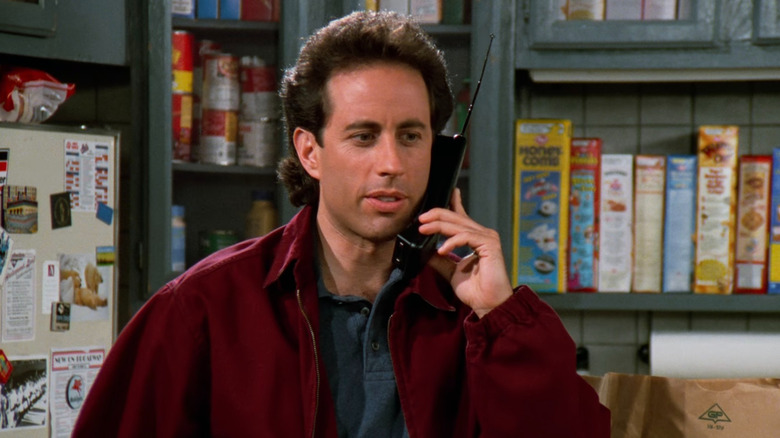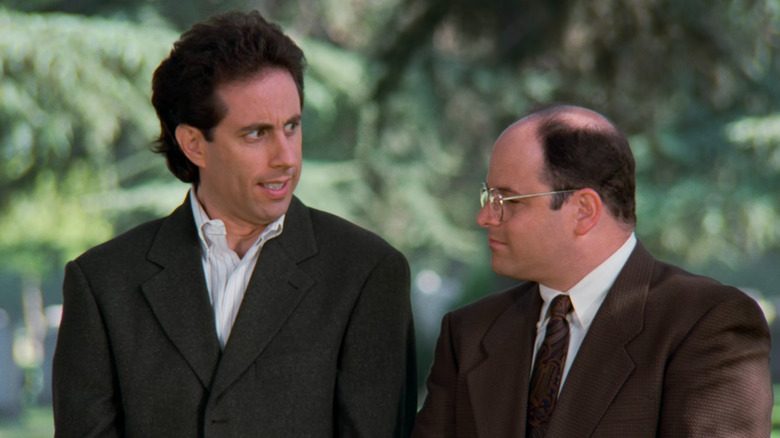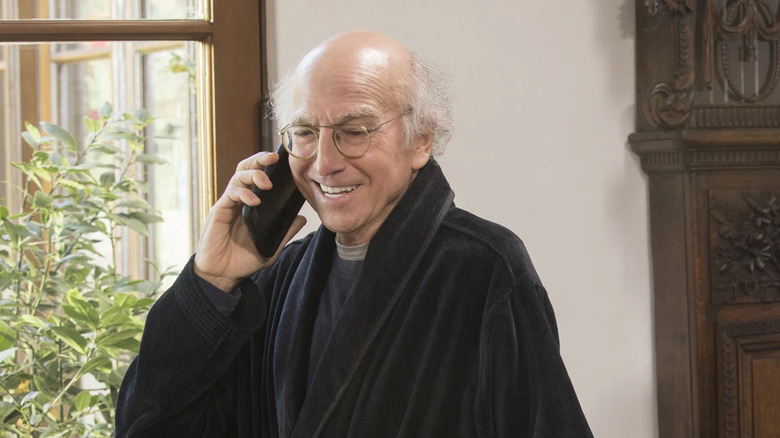Why Seinfeld's Season 8 Premiere Episode Made Everyone Nervous
"Seinfeld" was truly like no other comedy on television. It refused to adhere to sitcom conventions with the likes of sympathetic main characters, life lessons, and happy endings. Jerry (Jerry Seinfeld), Elaine (Julia Louis-Dreyfus), George (Jason Alexander) and Kramer (Michael Richards) were all, in some form or another, sociopathic walks of life who only seemed to bring about a wave of trouble wherever they made themselves known. But that was part of the whole appeal. Shows like "It's Always Sunny in Philadelphia" would follow in its footsteps because there's an innate curiosity and sicko satisfaction with discovering slivers of humanity inside a batch of unlikable characters. NBC viewers couldn't get enough of "Seinfeld," as the series' popularity and awards consideration grew with each passing season. It was on top of the world. The show reached a turning point, however, at the end of its seventh season for a couple of reasons on account of its divisive finale.
"The Invitations" brought the season's running storyline to a close in a manner that was pretty mean, even by "Seinfeld" standards. Susan Ross (Heidi Swedberg), who was first introduced in season four as the NBC executive turned love interest, returned to the show in its seventh season, where George proposed to her. The season saw George start to realize the extent of what he's done and regret his decision, looking for any way to get out of his engagement. The character essentially gets the out of a lifetime when Susan shockingly drops dead in the finale after licking the glue of hundreds of envelopes containing their wedding invitations. "Seinfeld" had killed off plenty of side characters before, and even pumped Jerry full of lead in a shockingly violent dream sequence back in season 2, but this was uncharted territory.
The decision to kill off Susan in such a casually cruel manner proved to be controversial among casual viewers, especially since none of the characters seemed all that broken up about it, let alone George. Such a darkly comic fate makes sense within the context of these characters having little regard for the anarchy they unleash, intentional or otherwise. If anything, the equally divisive series finale gives the core four the comeuppance they've always had coming to them. Even Swedberg seemed perfectly fine with the character's undignified exit. In the meantime, however, "Seinfeld" was renewed for its eighth season and viewers were interested to see how they would follow up such an ending.
As it turns out, the creative team behind the show were pretty nervous, not because of how they would respond to what they did to Susan, but because it would be moving forward without the involvement of series co-creator Larry David.
The Foundation was the first episode without Larry David's involvement
"Seinfeld" was originally pitched to NBC by David and Jerry as a show about how a comedian gets their material. It was the brainchild of these two comedic forces, who pooled their ideas and resources to hone what would become one of the greatest sitcoms of all time. However, after "The Invitations" aired, David finally made the decision to leave the show after years of saying he would. Going into the season eight premiere ("The Foundation"), the cast and crew were equally unsure of whether continuing the show was the right decision or not.
In a DVD featurette for "The Foundation," writer Alec Berg reminisced about how David's absence felt like a jest, until it hit them that they were indeed on their own:
"Actually, we used to joke, like, we were four or five episodes into that eighth season and were like 'I think Larry's coming back this week. I got a good feeling. He's gonna come walking in and everything's gonna go back the way it was.'"
"We all looked to Jerry now," says cinematographer Wayne Kennan in that same featurette. Series mainstays like Julia Louis-Dreyfus were initially worried about the quality blowback the show would receive, but it was Michael Richards who found himself onboard the show's continued existence because he believed in Jerry's initiative as an artist:
"I knew that Jerry would not continue that show if he didn't think we could make it happen...cause Jerry is a perfectionist and there's no way we would have gone on. I called Jerry, we talked, and he felt we could make it happen. I said 'okay, let's go.'"
Jerry may have had his own reservations about taking hold of a television phenomenon on his own, but he felt that his many years of working with David had prepared him to handle such a huge changing of the guard (via DVD featurette):
"As much as I have Larry to thank for everything that he did, he also, by leaving, gave me this opportunity to prove to myself that I could do it on my own. But I don't think I could have done it any earlier than that. It took me all that time. It took me those seven years to kind of develop a confidence because I wasn't a writer before this show. I wasn't a producer, I didn't know how to make all these decisions, but by that point, I was and I did know how."
Larry David's departure was a result of wanting to do something else
Whenever a creative force who's been with a show from the very beginning leaves, whether it be a crucial member of the acting ensemble or a showrunner, there's this sense of "the glory days are behind us." Sometimes it works out and other times, it further accentuates the missing pieces that made the whole operation go round. "Seinfeld," thankfully, was able to withstand the loss of one of its founders and continue on for two more seasons with plenty of great episodes. So why did David leave the show? It all came down to exhaustion.
"Seinfeld" may have been at its creative peak, but David was done. There was no real animosity between him and Jerry, so much as a realization that it was time to move on to greener pastures. I think anyone who considers themselves artists knows that exact feeling of working on something for so long that it becomes numbing, especially when you've got a whole bunch of other ideas waiting to be explored. In a way, the decision worked out for both members of the "Seinfeld" as it allowed Jerry to take on a more fulfilling, if not challenging role, while David was able to get started on some projects of his own.
Among the body of work David accumulated post-Seinfeld, arguably his greatest success was that of "Curb Your Enthusiasm," a half-hour comedy series which featured a fictionalized version of the Los Angeles-based comedy writer bumping up against societal norms. The joke was always on David. Even more impressive than heralding "Seinfeld" for seven seasons was steering "Curb Your Enthusiasm" on HBO for 12 seasons and receiving a slew of Emmy nominations in the process, with two wins in the process. Plenty of the "Seinfeld" cast even made time for cameo appearances.
Every episode of "Seinfeld" is currently streaming on Netflix.


